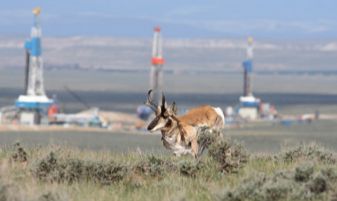
While the conference took place in Laramie, Wyoming, and was focused on many of the issues affecting Wyoming, I was struck by the number of topics that could be applied in other areas of an international energy practice. For example, the inherent conflict between the federal and state governments over management of land and energy resources is not unique to Wyoming. In a recent project assisting the Ministry of Petroleum and Mineral Resources of Somalia with recommendations on their petroleum laws and regulations, we dealt with many of the same issues regarding the management and revenue distributions from petroleum development. Control over petroleum and mineral resources in most countries is vested in the federal or national government, but the impacts of natural resource development fall on particular communities and in regions that expect to see economic and revenue benefits from development. Wyoming’s negotiations with (and occasional litigation against) the federal government regarding land use, mineral development and regulatory actions are examples of the disputes that can arise in a federal system and for using the courts and legal system to resolve those disputes.
In another example, the State of Wyoming has been proactive in limiting development in important areas of sage grouse habitat in order to protect the species from an endangered species listing by the U.S. Environmental Protection Agency. These same challenges are faced by many countries as energy development (including petroleum, renewables and power transmission lines) must be balanced with environmental and species protections. The problem is made more acute in developing and post-conflict governments that need the economic activity and revenue that energy development can bring. In Guyana, offshore petroleum development will need to be balanced with the large sea turtle nesting sites along the coast. Wyoming has shown that the goals of conservation and energy development are not mutually exclusive and it is possible to grow the energy industry while protecting the environment and natural beauty of the area.
Finally, oil, gas and coal revenues contribute more than 70 percent of Wyoming’s state budget. Many developing countries have, and may soon, find themselves in the same position as Wyoming. Energy development can make substantial contributions to a state’s economy and revenue base. In addition to the taxes and royalties, share of petroleum and other direct revenues, the higher wages and development of new industries (such as service companies, manufacturing and transportation) can be an economic windfall for the state. But these good times do not last forever. These commodities go through natural cycles of high and low prices that can be devastating if not managed appropriately. When the prices drop and activity goes away, Wyoming has shown the critical role that proper planning – such as a sovereign wealth fund – can have in protecting the state and its citizens from the price volatility of commodities markets.
These are just a few examples of how Wyoming’s continued leadership in energy and natural resources issues can have broader application beyond the state’s borders. As an energy practitioner and adviser to governments around the world, I am able to use many of the precedents set in Wyoming to help other governments navigate the many legal and policy challenges they face in their own natural resource development. Thank you to the steering committee, the School of Energy Resources and the Law School for another outstanding discussion and I look forward to attending next year!
